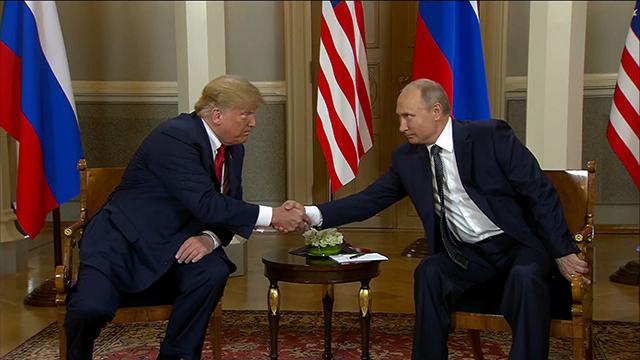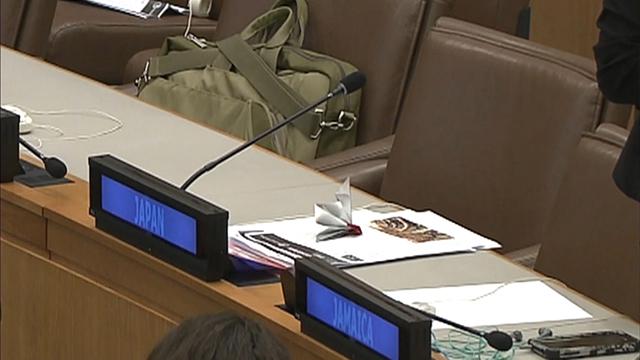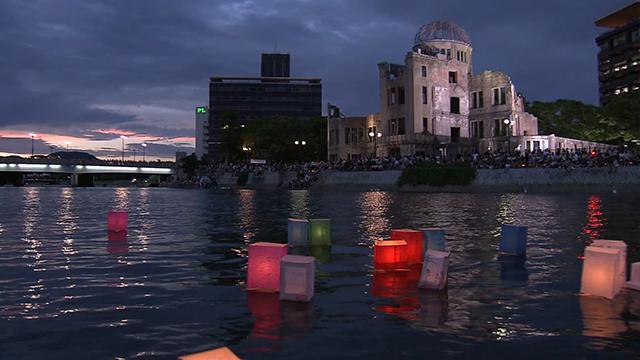Leaders Are Not Taking Nuclear Issue Seriously
A broad question first. How far are we from a world without nuclear weapons?
Unfortunately, we are still a long way from achieving a goal so many world leaders have emphasized that is having a world that is without the threat of nuclear weapons. We have made important progress but with many steps forward and many steps backward over the last 73 years.
The fact that the US and Russia have eliminated more than 80 percent of their nuclear weapons, these are positive signs but there remains the risk of accidental conflict or intentional conflict between the US and Russia or India and Pakistan. What concerns me most from the work I do now, is that the leaders are not focused, not taking it seriously enough.
You mean Mr. Trump and Mr. Putin?
Starting above all President Trump and President Putin, they should at the minimum be able to say the same thing as Mr. Reagan and Mr. Gorbachev said in 1985.That nuclear war cannot be won and must never be fought, which is a very simple, obvious statement. If these presidents made that statement, I think that would have an important psychological effect for the world.
They just met in Helsinki at a summit but, the nuclear weapons issue didn’t appear at the top of their agenda.
We still don’t know what the two presidents said to each other. But the indication is that Mr. Putin raised this topic. I think Mr. Putin understands this topic very well but Mr. Trump does not understand this. I had hoped that before the summit that they would be ready to extend the New START treaty which limits the number of weapons on each side. It will expire in three years if they don’t extend it, but they made no such announcement which is disappointing.
President Trump even criticized it in the past.
In the past, as he’s criticized everything that’s connected to President Obama.

US Has Obligation for Nuclear Disarmament
How did you feel when President Obama came to Hiroshima?
That was an inspiring moment. It made me very proud to serve under President Obama. In Washington I woke up in the middle of the night to watch his speech from Hiroshima live. It is important symbolically not just for the people of Japan but especially for the people of the United States, to be reminded of the truly terrible power that is at the fingertips of the US president, the Russian president, and many others around the world.
Explain to me the position of the US government on the Nuclear Weapon Ban Treaty.
The position hasn’t changed very much from the Obama administration to the Trump administration. The ban treaty is an important moral and ethical statement. The US government does not believe that it’s a very practical means to move towards the elimination of nuclear weapons.
I think the Trump administration has been still more critical about the advocates of the ban treaty and I don’t think it’s so necessary to be negative about the treaty. I think it is important that those who negotiated the treaty and supported it and those who are skeptical about it have a genuine dialogue about steps forward we can take that will put us in the same direction toward the goal that we share.
Critics say the ban treaty would undermine the cause of the Non-Proliferation treaty and efforts for disarmament.
Yes. Some people say that but I don’t agree. I don’t think it undermines the NPT. What concerns me more than that is that the Trump administration is unable to say that the NPT creates the legal obligation for the US to pursue nuclear disarmament. Every other President since 1970 has acknowledged that US has the obligation for nuclear disarmament, but the Trump administration has stopped making that very obvious statement. That is not the way that the world’s greatest power shows leadership.
Do you feel that there’s possibility that nuclear arms race will gather momentum again?
We already have what you could call a qualitative arms race, a technological arms race between Russia and the US, that seeks to improve the accuracy of weapons. And that’s of concern. If the NEW START treaty isn’t extended by the two presidents, then after the year 2021, there will be for the first time in 50 years no limits at all on the number of weapons, and then you would go from a qualitative to a quantitative arms race. That would be very expensive and very destabilizing.
Japan Is Best Placed to Lead Conversation
There are people who claim that nuclear weapons are effective for deterrence. Others don’t think so. How do you see these arguments?
That is the crucial question where I think there has to be greater dialogue among the world’s powers. Here’s the problem. Those countries that don’t have enemies, that don’t fear being attacked by nuclear weapons from another country, understandably are very concerned about the global effects of any nuclear war. On the other hand, those states that do have enemies, that have been threatened in the past or threatened today, see a value to the deterrence because it is their security, their existence then is at stake. And they feel they need to be defended by nuclear weapons. So you will never get them to say that deterrence is unimportant. And you will never get the first group to say deterrence is everything.
But I think that we can have the conversation. About how you can achieve security and deterrence in a world without nuclear weapons, using conventional means. And I think Japan is one of the countries that is best placed to begin and lead such conversation.
Japan’s government has been criticized by groups of people in Japan for not participating in the Nuclear Weapon Ban Treaty.
It’s not my job to criticize the government of Japan. The negotiation of the treaty was an important step, as I said, a moral and ethical statement. If I were the government of Japan it would be a very difficult choice to decide how to participate in the treaty.
Japan and the US are security partners. And right now there are security threats to Japan, North Korea and although we don’t like to talk about it, China. So for Japan to break from the US on this important issue, at a moment of negotiation with North Korea, if I were the Japanese government I would be very careful before taking a step like that.

President Trump says there’s no longer a nuclear threat from North Korea.
I think, like many other statements from the president, it is what he wishes to believe, and it is not connected to reality.
Trump Policy Is Upside Down
What would be the best way for denuclearization of the Korean Peninsula?
I think that’s a complex question. There’s no simple way but it’s important that the US and North Korea seek to build a respectful relationship. It’s very difficult because there are good reasons not to trust Kim Jong-un and good reasons not to trust Donald Trump. But if the two of them can build a genuine dialogue I hope we could begin to seek step-by-step elimination of certain weapons and build peace between the two countries.
But this is not as quick or simple a process as Mr. Trump seems to think. And the very first step has hardly been taken. So I am optimistic on North Korea but as I said we have barely taken step one.
And on abandoning the deal with Iran?
Here I am much more critical of President Trump. I think it was very dangerous decision – it is a violation of international law. Mr. Trump and his government frequently criticize North Korea or Iran for violating UN Security Council resolutions. But it was a violation of the resolution that endorsed the denuclearization deal, the joint comprehensive program of action.
He is being much harder on Iran, which has no nuclear weapons, has very tight inspection action and verification of all its facilities. He is not as tough on North Korea, which has many weapons and which is not cooperating with the international community. This is an upside-down approach to the real threats that we face. Iran is not a threat to the US -- it is a threat to some of our friends in the Middle East. North Korea is an immediate threat, a threat to our US allies, the Republic of Korea and Japan. And yet they are treated as if they are reliable partner. So the Trump policy is very upside down.
A Big Problem with Plutonium
Quite recently, you said Japan’s possession of plutonium might be counterproductive to solving the North Korean issue.
It is a minor issue, possibly not important in the end. But if the US makes progress in this negotiation with North Korea and if we get to the best possible outcome then we would want to see North Korea stop all reprocessing of spent fuel and stop production of plutonium. And if we get there it would be a little bit easier if no one else in Asia is producing plutonium. So it is theoretical in a small way that Japan can contribute to success in the North Korea negotiations.
But my real concern with plutonium is broader. Plutonium is a very nasty substance and in my view, it makes no economic sense to continue the policy of reprocessing and creating plutonium. This is not about the debate of nuclear power. Whether Japan in the future has one hundred reactors or zero reactors -- that’s not my issue, that’s an issue for the people and government of Japan. But whether you have 100 or zero reactors, you have a big problem with plutonium. It creates a waste product you must deal with and it’s not the valuable economic asset that some people believe.
So that’s a debate that I hope Japanese people and the Japanese diet will hold. Last month I met with several members of the diet just to talk about this issue and I encouraged them to have a hard look at the policy on spent nuclear fuel.

Lastly, what is your message to the survivors of Hiroshima and Nagasaki?
I had the opportunity to meet with some Hibakusha in Hiroshima two years ago. I met them in New York, Vienna and Geneva and their message is always emotional and moving. I wish that every citizen of the United States had the opportunity to visit Hiroshima and Nagasaki -- I wish every world leader would take that opportunity to listen to this testimony of those who lived through that time in 1945.
It’s a message for my generation, it’s a message for younger generations. It’s a monument for mankind’s future. Hibakusha have all my respect not because they experienced the tragedy but because they want to turn that tragedy into something meaningful for humanity.